To provide the best experiences, we use technologies like cookies to store and/or access device information. Consenting to these technologies will allow us to process data such as browsing behaviour or unique IDs on this site. Not consenting or withdrawing consent, may adversely affect certain features and functions.
The technical storage or access is strictly necessary for the legitimate purpose of enabling the use of a specific service explicitly requested by the subscriber or user, or for the sole purpose of carrying out the transmission of a communication over an electronic communications network.
The technical storage or access is necessary for the legitimate purpose of storing preferences that are not requested by the subscriber or user.
The technical storage or access that is used exclusively for statistical purposes.
The technical storage or access that is used exclusively for anonymous statistical purposes. Without a subpoena, voluntary compliance on the part of your Internet Service Provider, or additional records from a third party, information stored or retrieved for this purpose alone cannot usually be used to identify you.
The technical storage or access is required to create user profiles to send advertising, or to track the user on a website or across several websites for similar marketing purposes.
 Remote workers are still struggling with distracting working environments, stress and an ‘always-on’ culture after a year of working from home. Egress’ Remote working: one year on report claims that three-quarters of remote workers reported feeling worse as a result of long-term working from home, with almost over one-third (39 percent) feeling more stressed. (more…)
Remote workers are still struggling with distracting working environments, stress and an ‘always-on’ culture after a year of working from home. Egress’ Remote working: one year on report claims that three-quarters of remote workers reported feeling worse as a result of long-term working from home, with almost over one-third (39 percent) feeling more stressed. (more…)








 The cost of poor company culture is a staggering £20.2 billion per year, according to research from HR software provider
The cost of poor company culture is a staggering £20.2 billion per year, according to research from HR software provider 
 We are scarcely nine months into the Covid-19 pandemic, after a long spring and harsh summer. Social distancing has led to remote working becoming widespread, leading to doubts regarding the office’s long-term relevance. However, Jones Lang LaSalle (JLL) argues in a recent
We are scarcely nine months into the Covid-19 pandemic, after a long spring and harsh summer. Social distancing has led to remote working becoming widespread, leading to doubts regarding the office’s long-term relevance. However, Jones Lang LaSalle (JLL) argues in a recent 
 People working from home during the pandemic are experiencing higher levels of stress and withholding mental health conditions from their employer, for fear of a negative impact on career progression, according to a new
People working from home during the pandemic are experiencing higher levels of stress and withholding mental health conditions from their employer, for fear of a negative impact on career progression, according to a new 
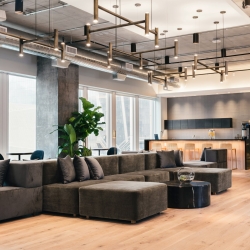 CBRE Group has announced the acquisition of a 35 percent interest in Industrious, a provider of flexible office space, which will also see CBRE’s existing flexible workplace firm Hana absorbed into Industrious.
CBRE Group has announced the acquisition of a 35 percent interest in Industrious, a provider of flexible office space, which will also see CBRE’s existing flexible workplace firm Hana absorbed into Industrious. 
 The UK COVID-19 vaccination programme is well underway. Once the over 50s, younger people with health conditions, NHS and care workers have received the vaccine, Prime Minister Boris Johnson has been clear that current lockdown restrictions could be lifted in stages with schools and business a top priority. The situation is under review, but there is an expectation that business premises could reopen as early as Easter, when a large proportion of the working age population may not have been vaccinated. That means the focus in workplaces and other multi-occupant spaces, especially those open to the public, must remain on limiting transmission to prevent the spread of
The UK COVID-19 vaccination programme is well underway. Once the over 50s, younger people with health conditions, NHS and care workers have received the vaccine, Prime Minister Boris Johnson has been clear that current lockdown restrictions could be lifted in stages with schools and business a top priority. The situation is under review, but there is an expectation that business premises could reopen as early as Easter, when a large proportion of the working age population may not have been vaccinated. That means the focus in workplaces and other multi-occupant spaces, especially those open to the public, must remain on limiting transmission to prevent the spread of 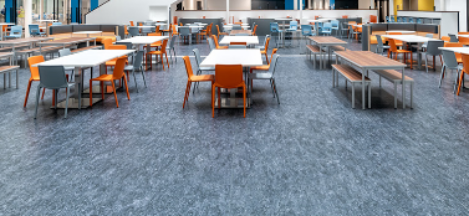
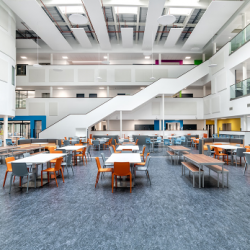 Opening its doors in late 2020, The Inverurie Community Campus in Aberdeenshire is a new £55m facility. One of the largest school constructions in Scotland, its 360 rooms accommodate 1,600 pupils and provides amenities such as a youth café, a community centre, and a swimming pool for students and the wider community.
Opening its doors in late 2020, The Inverurie Community Campus in Aberdeenshire is a new £55m facility. One of the largest school constructions in Scotland, its 360 rooms accommodate 1,600 pupils and provides amenities such as a youth café, a community centre, and a swimming pool for students and the wider community. 
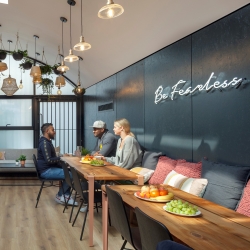 Let’s be honest, work life pre 2020 had its flaws, whilst the longing for variety of scenery, change of pace and even a train journey (somewhere…ANYWHERE) would be welcomed by many of us right now, many of us had become a bit ‘hamster wheel’ in our approach. Commuting was stressful, expensive and time hungry; our natural and individual rhythms squeezed into a set 9-5 schedule and workplace design had become a bit ‘quantity over quality’ – desks have been reducing in size year upon year in order that capacity could be increased. We had reached a point at which everything was ripe for change but there was largely a resistance to both flexible working requests and embracing much of the technological advancements that were already at our fingertips.
Let’s be honest, work life pre 2020 had its flaws, whilst the longing for variety of scenery, change of pace and even a train journey (somewhere…ANYWHERE) would be welcomed by many of us right now, many of us had become a bit ‘hamster wheel’ in our approach. Commuting was stressful, expensive and time hungry; our natural and individual rhythms squeezed into a set 9-5 schedule and workplace design had become a bit ‘quantity over quality’ – desks have been reducing in size year upon year in order that capacity could be increased. We had reached a point at which everything was ripe for change but there was largely a resistance to both flexible working requests and embracing much of the technological advancements that were already at our fingertips. 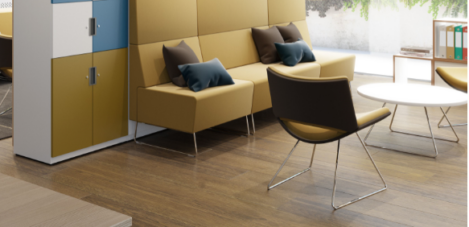
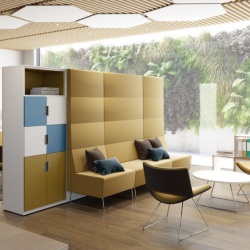 Be by
Be by 
 There’s no question that many people now, feeling the weight of lockdown 3 and with no clear view on the timing of any sort of ‘return to normal’, are finding it tough to stay motivated. Many are burnt out. We can gain some insight into what is going on for many individuals by way of neuroscience, specifically how the brain works and how it copes with changing situations.
There’s no question that many people now, feeling the weight of lockdown 3 and with no clear view on the timing of any sort of ‘return to normal’, are finding it tough to stay motivated. Many are burnt out. We can gain some insight into what is going on for many individuals by way of neuroscience, specifically how the brain works and how it copes with changing situations. 
 While workers in the UK have been working from home, if they can, for almost a year, a third say they miss commuting, claims research from recruiter
While workers in the UK have been working from home, if they can, for almost a year, a third say they miss commuting, claims research from recruiter 








March 22, 2021
The era of work personalisation is upon us
by Gary Chandler • Comment, Workplace design